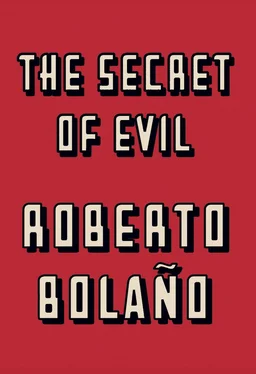2. The lecture must go on . I hope no one takes what I just said the wrong way. I was kidding. I didn’t mean what I wrote, or what I said. At this stage in my life I don’t want to make any more unnecessary enemies. I’m here because I want to teach you to be men. Not true. Just kidding. Actually, it makes me insanely envious to look at you. Not just you but all young Latin American writers. You have a future, I promise you. Sorry. Kidding again. Your future is as a gray as the dictatorship of Castro, of Stroessner, of Pinochet, as the countless corrupt governments that follow one after the other on our continent. I hope no one tries to challenge me to a fight. I can’t fight without medical authorization. In fact, when this talk is over I plan to lock myself in my room to watch pornography. You want me to visit the Cartuja? Fuck that. You want me to go see some flamenco? Wrong again. The only thing I’ll see is a rodeo, Mexican or Chilean or Argentine. And once I’m there, amid the smell of fresh horse shit and flowering Chile-bells, I’ll fall asleep and dream.
3. The lecture must plant its feet firmly on the ground. That’s right. Let’s plant our feet firmly on the ground. Some of the writers here are people I call friends. From them I expect nothing but perfect consideration. The rest of you I don’t know, but I’ve read some of you and heard excellent things about others. Of course, certain writers are missing, writers without whom there’s no understanding this entelechy that we call new Latin American literature. It’s only fair to list them. I’ll begin with the most difficult, a radical writer if there ever was one: Daniel Sada. And then I should mention César Aira, Juan Villoro, Alan Pauls, Rodrigo Rey Rosa, Ibsen Martínez, Carmen Boullosa, the very young Antonio Ungar, the Chileans Gonzalo Contreras, Pedro Lemebel, Jaime Collyer, Alberto Fuguet, and María Moreno, and Mario Bellatin, who has the fortune or misfortune of being considered Mexican by the Mexicans and Peruvian by the Peruvians, and I could go on like this for at least another minute. It’s a promising scene, especially if viewed from a bridge. The river is wide and mighty and its surface is broken by the heads of at least twenty-five writers under fifty, under forty, under thirty. How many will drown? I’d say all of them.
4. The inheritance . The treasure left to us by our parents, or by those we thought were our putative parents, is pitiful. In fact, we’re like children trapped in the mansion of a pedophile. Some of you will say that it’s better to be at the mercy of a pedophile than a killer. You’re right. But our pedophiles are also killers.
Natasha Wimmer
Just when Arturo Belano thought that all his adventures were over and done with, his wife, the woman who had been his wife and still was and probably would be until the end of his days (legally speaking, at least), came to see him in his apartment by the sea and announced that their son, the handsome young Gerónimo, had disappeared in Berlin during the Days of Chaos.
This was in the year 2005.
Arturo packed his bags and that night he boarded a plane bound for Berlin. He arrived at three in the morning. From the window of the taxi he observed that the city was at least outwardly calm, although he glimpsed the vehicles of the riot police and fires burning here and there in the streets. But in general everything seemed calm; the city was under sedation.
This was in the year 2005.
Arturo Belano was over fifty and Gerónimo was fifteen. Géronimo had gone to Berlin with a group of friends; it was the first time he’d traveled without one of his parents. The morning Arturo’s wife came over, the group had just returned, minus Gerónimo and another boy called Félix, whom Arturo remembered as very tall and thin and pimply. Arturo had known Félix since the kid was five years old. Sometimes, when he went to pick up his son from school, Félix and Gerónimo would stay and play in the park for a while. In fact, they might even have met one another for the first time in preschool, before either of them was three, though Arturo couldn’t remember having seen Félix’s face back then. Félix wasn’t his son’s best friend, but there was a kind of familiarity between them.
This was in the year 2005.
Gerónimo Belano was fifteen. Arturo Belano was over fifty, and sometimes he could barely believe that he was still alive. Arturo had set off on his first long trip at the age of fifteen too. His parents had decided to leave Chile and start a new life in Mexico.












